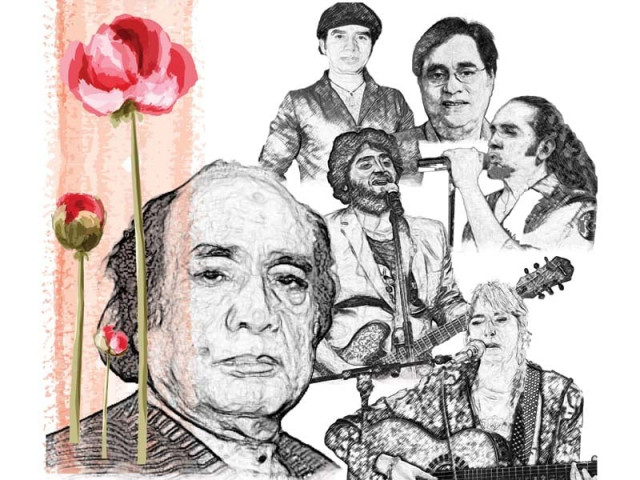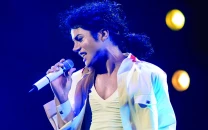Throwback: The journey of Mehdi Hasan’s ‘Gulon Mein Rang’
New versions have been sung by Bollywood’s in-house rocker KK and voice quality specialist Mohit Chauhan

The ‘Upbeat Version’ and ‘Serene Version’
have been sung by Bollywood’s in-house rocker KK
and voice quality specialist Mohit Chauhan respectively. DESIGN: SOBIA KHAN
“Its selection [by Khan] is a story itself because Faiz was considered a young poet whose ideas of revolution attracted people,” says culture maven and TV presenter Dr Omer Adil.
He says the leftist intellectual’s popularity coincided with the shift of musicians towards revolutionary poetry, away from “dark ghazals”. It also had to do with the whole wave of modernism in Urdu literature, Adil maintains. “The radio version had just a sarangi, a tabla and a tanpura yet it had become a massive hit.”
Habib Wali Mohammad’s son keeps his legacy alive
The ghazal’s resounding success catapulted Hasan’s career in the industry and he never looked back. In his book Melody Singers - I, Dr Amjad Parvez writes, “An anecdote linked with this song is that during many get-togethers, people would request Faiz sahab to recite the ‘Mehdi Hasan ghazal’.” The moment music director Rasheed Attre “picked it up” for the film, it was given a heavier treatment. “The film version has more orchestration. Attre had about 80 instrumentalists with him. He did not use them all but to make the sound more powerful and thematic, he introduced violins in it,” Adil adds.
On a side note, he says the ghazal nowhere fit the narrative of the movie. “It wasn’t written for the film in the first place and was not a situational song.” Qaisar considered himself no different from the revolutionaries and thought his film should also have a similar addition. “He actually chose the wrong poetic work,” Adil maintains.
Nonetheless, Gulon Mein Rang came to be known as Hasan’s ghazal and Faiz saw nothing objectionable with the idea.
I didn’t get into music because I had to: Sanwal Esakhelvi
Silence in Mardan
In a 1996 PTV interview, Hasan recalled an incident from before the film’s release that somewhat explains why Faiz might have happily turned over the ghazal’s ownership to the singer. “We were on a Pakistan tour that started on September 31, 1961 from Rawalpindi. The second or third station was Mardan where we were set to perform,” Hasan said, adding, “At the venue, the atmosphere was very strange. All my fellow performers were being booed off stage. Nobody wanted to listen to anything.” He said the organiser of the event, Rafiq Anwar, nudged him to go on stage and sing. “I said, ‘You want people to hoot me down, or what. They are not here to listen.’ Anwar said go and sing that ghazal of yours.” With his heart missing beats, Hasan stepped on the stage. “When they announced my name, nobody listened. So I sat and started the alaap. Suddenly they went silent. The ghazal started and I sang the matla [first verse]. Inside I knew at some point or the other the hooting is going to start,” he said. “Then came the first antra, second antra and fourth came the maqta [last verse] that says Maqam Faiz koi Rah Mein Jacha hi Nahin. Total silence. I couldn’t explain what happened.”
He later related the incident to his uncle, whom he quoted as saying, “This ghazal has unusual combinations of musical notes.” Hasan said every note has a complementary note, like a beloved. “Be it in seven or 12 … We have not gone as far as knowing which note goes with which. Had we known that we could literally kill the listener.” He said this is perhaps the reason why Gulon Mein Rang captivates you in a way that you are unable to explain what happened. “People ask me, ‘Mehdi bhai, please sing the badalo bahar ghazal for us.’ I tell them it is bad-e-naubahar to which to reply, ‘We don’t understand it but it is really good’.”
Over the years, many singers have come and gone, humming Gulon Mein Rang as they walked in Hasan’s alley.
Paying homage
While Hasan sang it for as long as he lived, his contemporaries such as the very humble Jagjit Singh and the formidable Runa Laila also sang the ghazal to pay their respects to the singing giant. While Singh’s is a live version from what appeared to be a Faiz centennial celebration, Laila’s version is part of her 1982 album Geet and Ghazals. Retaining their own individual styles and the ghazal’s original arrangement, the singers have covered the ghazal with great finesse.
Sonic surprise
The video of a white woman sitting in her living room, singing the ghazal over a soft tanpura score recently went viral. Turned out it was the UK-based singer Tanya Wells who has basic training in Eastern classical and a knowledge of Hasan’s and Nusrat Fateh Ali Khan’s works that does impress. While an anthropologist (and we do have too many) can better explain our fascination with this cultural appropriation and how it ties down to post-colonialism, neo-liberalism and several other isms, there isn’t really much to say about the singing. What we do take from this video, however, is that Khan and Faiz were international icons (with regards to the West), we had always known. What has come as a surprise is that Hasan too is loved by millenials in other parts of the world.
Across the border
From what we have been able to gather, Gulon Mein Rang was used thrice in Indian cinema. Let us first examine the latest and the more reasonable rendition.
Vishal Bhardwaj is a man whose influences range from Faiz to Shakespeare to Ray. His acclaimed 2014 film Haider, which is his third screen adaptation of a Shakespearean tragedy, shows Dr Hilal Meer listen to the ghazal on the radio, making his son, the young protagonist, correctly recite a half-verse from it before giving him his pocket money. The film has a cover of the Hasan version, sung by the current constant of every Bollywood soundtrack, Arijit Singh. Him singing Gulon Mein Rang is like Atif Aslam singing Tajdar-e-Haram; you admire their audacity more than you admire their vocals.
The remaining two versions belong to a 2009 film, Sikandar, whose storyline is also based in Kashmir. The ‘Upbeat Version’ and ‘Serene Version’ have been sung by Bollywood’s in-house rocker KK and voice quality specialist Mohit Chauhan respectively. However, the covers come with the criminal act of lyricist Neelesh Mishra fiddling with Faiz’s verses; he steals Faiz’s matla in broad daylight and slips his own high school grade lines under it. No wonder both the film and the soundtrack did not do well. Nonetheless, do give these two songs a listen. You might just like the way these renditions are made.
Pakistan’s answer
In their third album with a third vocalist, Pakistani band Fuzon also made a cover of Gulon Mein Rang. Part of the 2015 record Ik Ranjha, the song can be considered a direct upgrade to its Haider version. While both the tracks practically ride the same bassline, Fuzon’s cover has a more technically-able vocalist, in the shape of Khurram Iqbal, whose control is just remarkable. The sitar fillers and a guitar solo by Shallum Xavier are simply bonus additions. It might have been among the least known covers of the ghazal, Fuzon’s Gulon Mein Rang will surely have made both Faiz and Hasan smile from ear to ear.
There indeed is something about this ghazal that one cannot explain.
Published in The Express Tribune, May 30th, 2016.
Like Life & Style on Facebook, follow @ETLifeandStyle on Twitter for the latest in fashion, gossip and entertainment.



















COMMENTS
Comments are moderated and generally will be posted if they are on-topic and not abusive.
For more information, please see our Comments FAQ